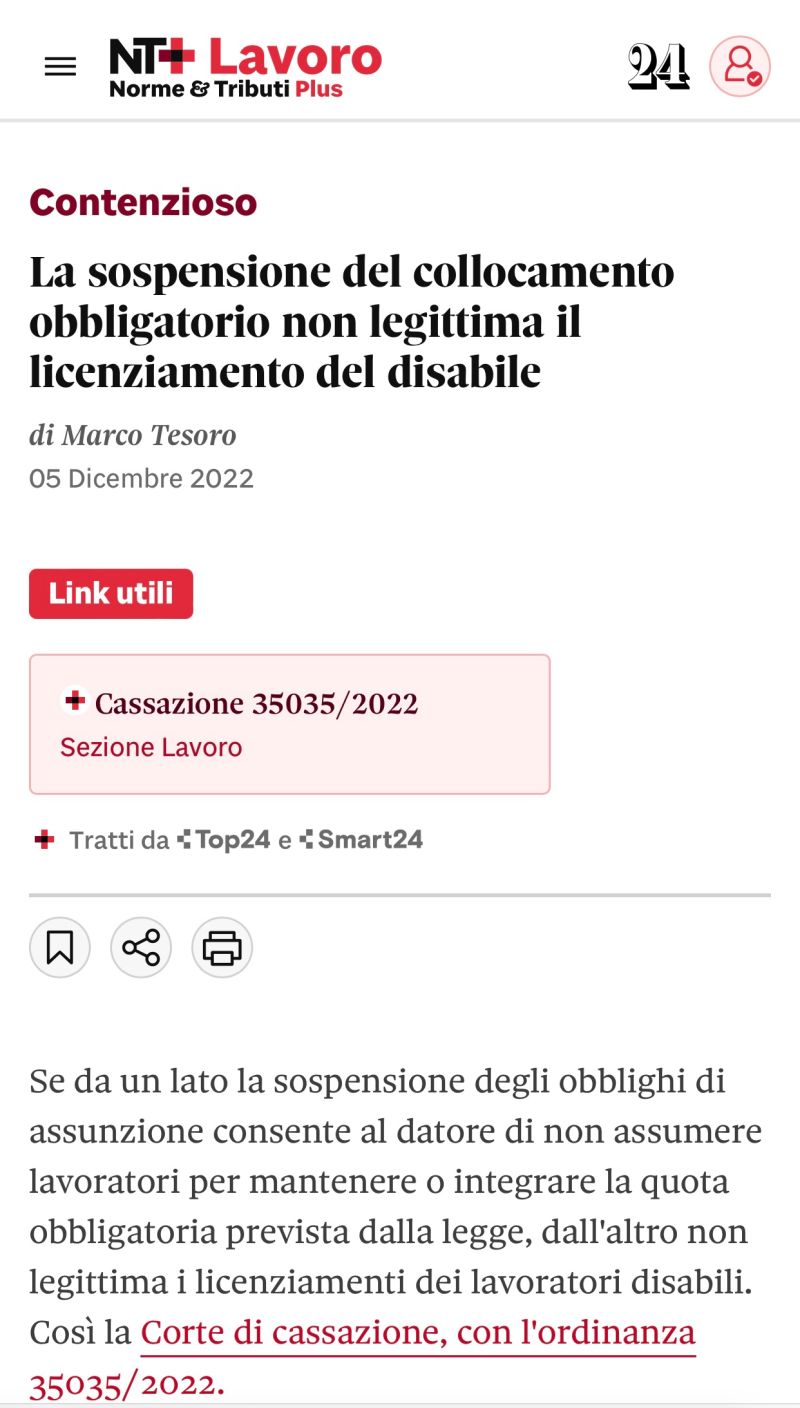
Published on Sole24Ore – NT Lavoro – on 06/12/2022
While the suspension of hiring obligations allows the employer not to hire workers in order to maintain or supplement the mandatory quota provided by law, it does not legitimise the dismissal of disabled workers.
Thus, the Court of Cassation with its judgment no. 35035/2022.
The case origanetes by a collective redundancy started by ad airway company, at the end of which a disabled worker, employed under Law 68/1999, was also dismissed.
The Court of First Instance and the Court of Appeal, after ascertaining that the dismissal of the disabled worker had affected the reserve quota provided for by Article 3 of Law 68/1999, declared the dismissal unlawful and applied the reintegration protection, considering the case unlawful regardig the criteria of selection of the employees to be dismiss.
The company appealed to the Court of Cassation claiming, among other things, that Article 10 of Law 68/1999 had been violated, since they had provided proof that they had obtained the suspension of employment obligations and were therefore exempt from the obligation to hire disabled workers in order to achieve the reserve quota and were also authorised not to maintain it. In another respect, the company argued that the employee had not offered proof that she had been recruited by means of the mandatory employment of protected classes scheme of workers nor that she had been counted in the relevant quotas at the time of her dismissal.
The Court of Cassation rejected the employer's appeal, recalling that, in the mind of Article 10(4) of Law 68/1999, dismissal for staff reduction or for justified reasons exercised against a compulsorily employed worker is voidable if, at the time of termination, the number of compulsorily employed workers is less than the reserve quota provided for in Article 3 of the same law.
In the context of actions to promote the integration and occupational integration of disabled people, for the Court, the ratio of the provision is to prevent that, on the occasion of individual or collective redundancies motivated by economic reasons, the employer may exceed the limits imposed by the legislation protecting workers belonging to protected categories.
This prohibition, however, is partly offset by the suspension of hiring obligations for companies benefiting from wage integrations or for the duration of the procedures provided for by Law 223/1991, so that in the case of a crisis companies are exempt from the obligation to hire new workers in the protected categories, but they cannot involve disabled workers already in force in dismissals motivated by economic reasons, if this affects the reserve quota.
So, the Supreme Court concludes outlining that "the suspension of hiring obligations allows the company not to hire workers in order to maintain or to reintegrate the mandatory quota provided for by law and, therefore, to legitimately find itself below the reserve quota, without, however, legitimising it to make redundancies within the framework of disabled workers".
Also with regard to the applicable protection the Court of Cassation confirms the reasoning followed by the Court of First Instance, since the violation of the reserve quota, in the case of collective dismissal, it’s a "violation of the criteria of choice" with the consequent application of the reintegration protection under Article 18, paragraph 4, of Law 300/1970, considered to be "an interpretative option that respects the legislative text and conforms to the purposes of the discipline - also the international one - on the subject, set up for the special protection of the disabled".

